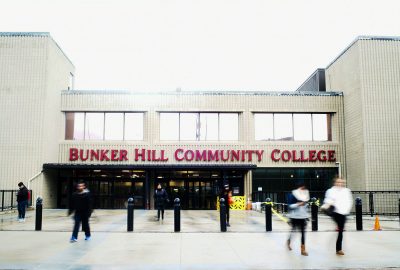Governor Maura Healey and Mayor Michelle Wu are expanding efforts to provide free community college tuition to underserved communities across Massachusetts.

Healey budgeted $20 million in fiscal year 2024 for MassReconnect, a program that allows Massachusetts residents over the age of 25 to attend any public community college tuition-free, according to a brief released by Healey’s office.
Mayor Michelle Wu announced an expansion of the city’s existing Tuition-Free Community College plan (TFCC) on Thursday, which now allows older adults and undocumented immigrants in Boston to join the program. If eligible, all residents can attend one of six participating community colleges tuition-free beginning in the fall.
Boston’s tuition-free program includes Benjamin Franklin Cummings Institute of Technology, Bunker Hill Community College, Massasoit Community College, MassBay Community College, Roxbury Community College and Urban College of Boston.
The $4 million TFCC investment is funded by a combination of $3 million in federal funding provided to Boston through the American Rescue Plan as well as $1 million secured by U.S. Representative Ayanna Pressley through the Community Project Funding last year, according to a statement.
The program will cover tuition and mandatory fees for associates degrees or short-term certificate programs after any other financial aid is applied. It will also provide students with a $250 stipend per semester for up to three years for college-related expenses.
Katy Gall, director of grants at the Worker Empowerment Cabinet for the city of Boston, said the Boston Bridge program partners with a state program called the Commonwealth Commitment to pay the full tuition of eligible students transferring from a community college to a Massachusetts four-year state college.
“The Commonwealth Commitment offers a very substantial discount for students, and we’re saying we’ll take it one step further and pay the full amount,” Gall said. “So any student from Boston who meets the Commonwealth Commitment criteria would qualify for a free bachelor’s degree tuition.”
Gall said one goal of the expansion is to increase enrollment across Boston’s community colleges, along with increasing the “persistence and completion” of degrees.
“We want to make sure that students enroll but that they’re also getting their degree and that we’re doing whatever we can to help them kind of get over the finish line,” Gall said.
When tuition-free community college began in June 2016, Bunker Hill Community College was one of two schools initially part of the program, and continues to be as the program expands.
“It’s a really exciting thing to be a partner with the city of Boston and to have a champion of college access like Mayor Wu recognize the value of community colleges in improving college access to Boston residents and training and educating a diverse, prepared workforce for the future,” said Brendan Hughes, director of public relations at BHCC.
Hughes said he expects an increasing enrollment at BHCC to align with the expansion of TFCC, and highlighted the college’s essential connection with Boston Public Schools.
“I think as long as that special relationship sort of continues to grow, we will always be eager to welcome more students from BPS and from Boston at large as a part of this program,” Hughes said.
Alex Villanueva, the executive director of communications and marketing at Massasoit Community College, said the college is excited about the expansion of the program for increasing access to affordable education.
“An opportunity like this is designed hopefully to entice more students who are on the fence about going back to school who may be like ‘I can’t quite afford it,’ … to give them that opportunity,” Villanueva said.
Villanueva called the expansion a “lifeline” for students, providing them with an opportunity to “change their life for the better.”
“It certainly shows an appreciation on the part of our leaders in the power of an education, understanding that getting students back into college, particularly again at the community college level, is a great opportunity to ensure that these students are advancing themselves, are taking on the opportunity to make the next step in their career for themselves or for their family,” Villanueva said.
Jeremy Solomon, associate vice president for Institutional Advancement, Marketing and Communications at MassBay Community College, said the MassReconnect program is a “sound investment by the Commonwealth and Healey and her administration.”
Solomon called community colleges the “unsung hero” of the Massachusetts economy, adding that the college is gratified to continue their service.
“This is a win-win for the Massachusetts economy that needs a skilled workforce, and for the employers in our communities that are struggling to find qualified individuals,” Solomon said.
Sharon Hinton, executive director of Black Teachers Matter and an educator who has taught nearly every age of students in Boston, said the issue of affordable education is just one of many problems with the education system.
“Mostly Black people, African Americans are moving out of Boston, because they can’t afford to be here,” Hinton said.
Hinton said although the expansion of tuition-free community college is great, high schools today don’t provide their students enough resources to prepare themselves for college in the first place, noting that college might not be the best fit for everyone.
“Boston Public Schools used to have options. So at an early age, you didn’t have to go to college, you could actually pick up a trade, that’s not what’s happening now,” Hinton said. “The schools are focusing everybody to get a college education, which is expensive, and then the college isn’t necessarily justifying the exorbitant increases in the cost of education.”
Hinton said the government and the board of education should use the money to provide resources for faculties and excellent education for students.
“Each one of these colleges and universities have their strengths, and the community colleges do too,” Hinton said. “I just think it should be more widely supported by the government.”





















































































































